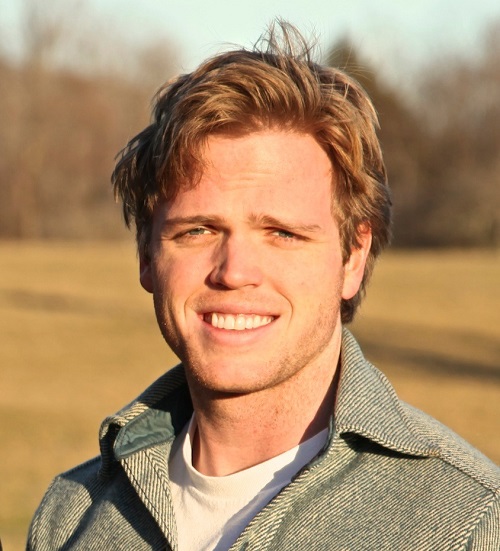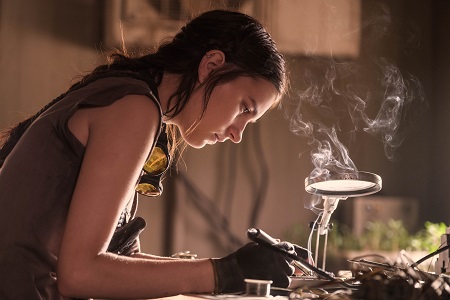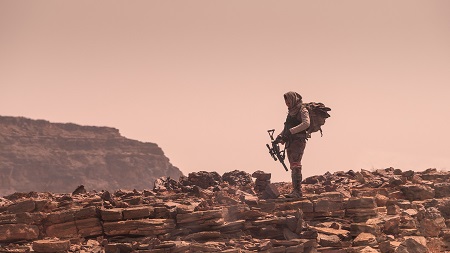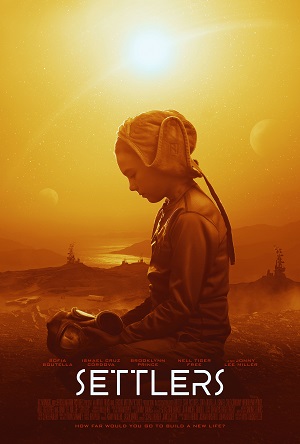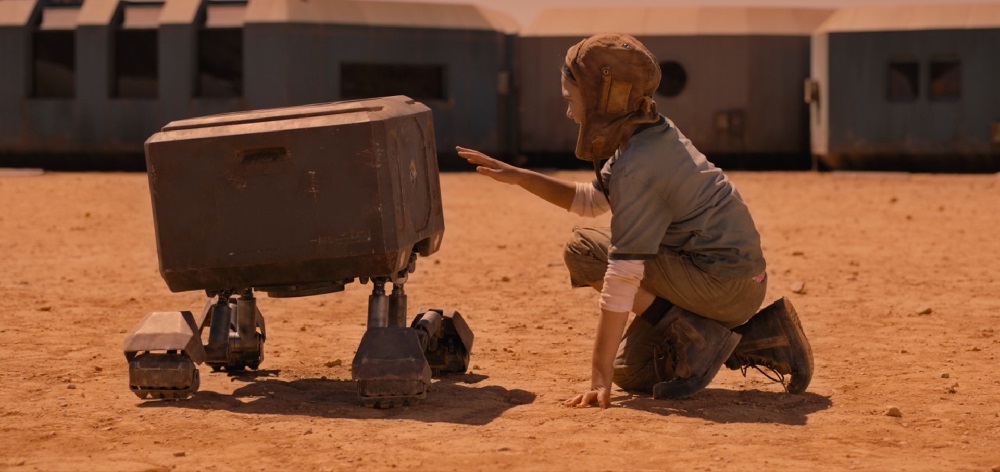
“Settlers” – Interview with Wyatt Rockefeller
by Sara Michelle Fetters - July 23rd, 2021 - Interviews
Everything is Relevant
Settlers filmmaker Wyatt Rockefeller on crafting a character-driven sci-fi spectacle
Reza (Johnny Lee Miller), Ilsa (Sofia Boutella), and their nine-year-old daughter Remmy (Brooklynn Prince) are working a small, isolated farm on a desolate patch of land they’re thankful to call their own. They’re colonists who have come to Mars looking for a fresh start, and there’s nothing they won’t do to protect what they consider theirs.
The drama fueling writer-director Wyatt Rockefeller’s intense, quietly intimate science fiction thriller Settlers comes in the form of Jerry (Ismael Cruz Córdova), a lonely wanderer who insists the plantation where this family resides does not belong to them. This leads to a crisis of conscience for all involved, especially young Remmy, who must learn more about this world, the ways it can spring into sudden, savage violence, and some secret harsh truthskept from her by her parents.
I sat down with Rockefeller to talk about his ambitious feature-length debut. Here are some edited transcripts from our wide-ranging conversation:
Sara Michelle Fetters: I think the first question that jumps out at me is, how the heck does one go from working for President Obama and being a part of the Environmental Protection Agency to making an intimate indie sci-fi thriller about lonely people colonizing Mars?
Wyatt Rockefeller: [laughs] It’s a fair question. I’ll start out by saying I’ve actually wanted to make movies since I was 11 years old. At that point it was just with dad’s camcorder and with whoever I could talk into doing it on the weekend.
I see the Star Wars poster behind you. My neighbor had a fog machine and we got the spaceship shots using my toy Millennium Falcon. That was pure fun. I always try to remember what that felt like now, especially when it counts.
I graduated [college] in 2007, and I got swept up in the Obama campaign. I drove to LA to take an internship or job with a production company, and I ended up leaving it to go join the Obama campaign. I thought I was just going to work in New Hampshire. I ended up going through the election and then ended up working in the administration. I took a job with an energy startup thereafter.
While working in this context at this energy start-up, which was based in Dar es Salaam, Tanzania, I was back at a more grassroots level, much like what I was doing during the campaign. Here I was doing something I was really loving, that I felt was important, but I was lying awake at night thinking about the movies I wanted to make and the stories I wanted to tell. I couldn’t sleep until I’d write down a bit of dialogue from the scene that was stuck in my head.
At some point you just have to realize, look, this is what you care most about, so you’re going to have to work hardest at this and whatever impact you can have is going to be maximized through what you love. So I applied to film school. I decided hell or high water I was going to figure out a way to make [filmmaking] work.
SMF: You talk about how you were always coming up with ideas and jotting them down. Where did the specific inspiration for this story come from? I feel like some of it obviously came out of the experiences you were having, probably while you were working for Obama and at the EPA considering some of the themes throughout the film.
WF: One of the great things about film, and storytelling in general, is that everything is relevant, right? I did not sit down to write a political movie. My wife actually pointed that out. She’s one of the producers and she said, “I know you didn’t mean to write a political movie, but you do need to realize you started writing this in the fall of 2016 right after the presidential election.” This was when immigration was an especially hot topic, not only in the US, but also in Europe, with the Syrian war and the refugee crisis that was unfolding there.
And she was right. Even though I didn’t mean to write a political movie, I somehow wrote a movie about the climate crisis, the mass displacement of people as a result of that crisis, and about sexual power dynamics, which had also been in the news.
We’re all products of our times. Working in genre, working in sci-fi, is a great opportunity to do an end-run around a person’s bias. You can engage with these topics of the moment, but the places and the names are different, and so people are more open to [exploring them].
SMF: When you’re telling a story like this, and you have these complex themes, how do you balance how much information you give the audience and how many pieces to omit and leave it up to their imagination as to the final assembly?
WF: It’s a very good question. It’s one I’ve agonized over through all stages of the process.
I think it’s very important that when you’re creating a world, you need to have worked out the whole backstory. Also, because they’re in this remote location, everything that’s there has been transported along the way. Everything on set that you see on-screen needs to have a reason for being there. It needs to have its own backstory. So there is quite an elaborate backstory, but you have to decide, okay, this all informs the reality of the world, what do people need to understand to comprehend the stakes?
I think Alien does a very good job at showing you very little, and because of that, you fill the whole universe with your imagination. I think the most vivid images are the ones that are off-screen, the ones that the film puts in your head, that you don’t actually see because they’re just going to be so much more vivid in your head.
SMF: I love that you bring that up because Alien was one of the films that came to mind as a timeless sci-fi thriller that gives you all the pieces that you need to know about this world without actually explaining them to you. Some others that came to mind as I was watching were Phase IV, the ant movie, and Planet of the Apes, and then obviously Silent Running, especially as it involves Steve.
You’ve got to talk to me about Steve. What was bringing Steve to life like for you, just as if you were still that kid that used to play with your Millennium Falcon while making home movies?
WR: It was a dream come true. I was huge into Star Wars, as well as a bunch of other things. I just remember I would pore over those books about Lucasfilm and Industrial Light & Magic and Weta Workshop, and just how they brought these things to life, the sets and the creatures. Seeing all the prototypes. I thought that was all so cool.
To be able to walk into Millennium Effects, which built the puppet that was Steve, and to see all the other things that they had got going on? There were a bunch of alien heads they were building for another movie. There was stuff everywhere. It was just like, oh my god. This is a fun day at work. [laughs]
Steve is basically a mix of puppetry and VFX; the VFX were utilized for the more elaborate movements. We had to be very specific about when to deploy the VFX, because we were shooting on a budget. It was a great collaboration between the departments, and designing him really was something special. I wanted his form to follow his function, and together we figured out exactly what that would mean, what he does and how he should look as a result.
SMF: In regard to form following function, moving to the human actors: Brooklynn Prince. I wonder how much a child actor’s performance is really them, and how much is thanks to the direction. But now, after watching her and everything that I’ve seen from The Florida Project forward, she is stunning. She’s got it, whatever that “it” is.
For you, though, how much direction do you give an eight- or nine-year-old, and how much freedom do you allow her, especially as it relates to her co-stars, Sofia Boutella and Johnny Lee Miller, to make that family dynamic real and organic in such a limited amount of time?
WR: First of all, it helps that she is just wise beyond her years, I basically look up to her. Brooklynn is also the more experienced filmmaker. She’s directed a short film! She’s just very incredibly professional.
I’ve worked with kids before, and this didn’t feel like you’re working with a kid. Her dad was on set with us and is very involved in her process and helping her get into the role. Her mom wasn’t there on set but would still help her get her lines ready the night before. It was a team effort.
I think it’s especially important to incorporate the parents when you’re dealing with such sensitive material, material that is hard for a nine-year-old to wrap her head around, however mature she is. It was just great to be able to have them as collaborators.
SMF: Did she and Nell Tiger Free ever communicate or talk? Did they collaborate on the character, or did you have them do their own thing?
WR: They did [collaborate]. All the actors basically stayed in this lodge together. They all had their meals together. We were able to do a little bit of rehearsal with Johnny and Brooklynn, who had come [to the location] first. That was very helpful, I think, especially for Brooklynn.
That relayed to the other actors as well, just understanding how Brooklynn works, what she needed. I think it was good to have Brooklynn and Nell overlap. I think that they both picked up on right away who Remmy is. She’s this strong character, a determined inquisitive girl. We didn’t have to worry too much about getting mannerisms right, because they just got it naturally, I think. They fell into it. But there were some eerie overlaps, I will tell you, between the two of them.
SMF: How did you find Nell? She’s just wonderful. While she doesn’t have as much screen time as Brooklynn does, she’s still just lovely in the movie.
WR: We were incredibly lucky to find her. Actually, Nell found us, really. Again, I was punching above my weight with all of them [the cast]. They’re all much more established than I am.
But we really hit it off. Nell looks like an older version of Remmy, but that was in some ways secondary, that was just checking a box. Like Brooklynn, Nell’s capable of really putting herself in the mind of the character and believing and living out what they are going through. If it’s in the movie, it is hard things that Nell put herself through.
There was one scene in particular that was particularly harrowing for her. But that lived experience of going through that actually informed choices Nell made in subsequent scenes. We actually amended the script based on those choices, and I think this made the movie better and got closer to a lived truth, which makes it all worthwhile.
SMF: You do challenge the audience with some of the decision-making that happens with a few of your characters, especially as it pertains to Ilsa and Jerry. What were those discussions between you and Sofia and Ismael Cruz Córdova like as you ensured that these various character beats or motivational choices — whatever you want to call them — no matter how disquieting for the audience, still were organic and didn’t feel like contrivances just to get the plot where you needed it to be?
WR: I think the key is that [the actors] believe in what they’re doing. That they understand why their character does what they do. That was a process that started in the writing and continued through a lot of conversations with the cast to make sure they were able to inhabit the character in a way that they believed what they were saying. If they couldn’t, if it didn’t make sense, we would change it.
I can’t recall if we did any specific things, but there was some improvising going on. We were very controlled about what information is known [by the audience]. At those points, you do have to stick to the script. But I did want to give the actors as much freedom as possible to make choices within the character. Fortunately, Sofia and Ismael are both such good actors that I really trusted them to make those choices. Feeling that trust, they [could], in turn, be freer and bring something more real to the screen.
SMF: They are great actors. When we talk about Cordova, it’s like part of you wants Jerry to be a villain. You want him to just be the bad guy. But because of his performance and also the way that you’ve structured his arc — because of this combination — that can’t be the case.
When you’re discussing those power dynamics and gender dynamics, what do you want people to see there? What are you hoping they’re thinking about as they are dealing with this complex character, who doesn’t always do or act the way we think we want him to?
WR: I’m trying to push these characters to a place where they are forced to perhaps reconsider what they’re willing to do or not willing to do. I want people to walk out and think, what would I have done in this situation?
With Jerry, I remember showing the script to folks at a pretty early stage and a friend of mine, who is also a filmmaker, said, “You’ve got to make Jerry more likable because you’re letting Remmy off the hook too easily.” I thought it was a very good point.
She was coming about it from the perspective of a woman. She was like, “I don’t know if you actually appreciate this scene you’ve written here. I can relate to this, because I feel like I’ve been in this scene. A place where I thought this was a business meeting and suddenly it has turned into something completely different.” Frankly, that is not an experience I’ve had. As a guy, it’s just not something I have to deal with in the same way.
To be able to have that outside perspective, that is so valuable. When you’re writing and directing, working with actors who are trying to put themselves in these characters, you are trying to walk in someone else’s shoes. I do think there is such value in that. It’s one of the great things about filmmaking, right? In storytelling. You get to see the world through other people’s eyes.
SMF: For you personally, what do you take away from this experience? What do you want to use going forward, now that you’ve had this adventure making this movie?
WR: I think in each outing as a writer and as a director, with this and in past jobs — which were at a smaller scale but in some ways it’s still the same — I would say each time you’re learning about where not to compromise. Filmmaking is all compromise. It’s about trying to close the gap between what you have in your head and what you’re able to accomplish on the day, given the resources that you have and the time.
Time is everything. There were changes I had to make in the script in pre-production to accommodate the realities of shooting in a very remote location in South Africa. We just weren’t going to get some of what I’d written within the budget that we had. It falls on the writer to change it.
Well, those changes cause issues within the story, things I realized were issues while we were shooting, which is not a great feeling. So I did change some scenes while we were shooting, but I knew we were going to have to fix it in the edit. We really reworked the first act, the editor [Johnny Daukes] and I.
I think the film is probably better as a result, but it’s because of those places where I probably shouldn’t have compromised but I did that caused those problems. I hope to take those lessons with me going forward.
SMF: For audiences, what do you want them to be thinking about and experiencing as they either leave the theater or after they watch this on PVOD?
WR: Again, I want them to walk out wondering what they would have done in this situation. For me, for subsequent projects that I’m interested in, I am just fascinated by people who find themselves in situations where they really have to look into the mirror and think, what am I willing to do? How far am I willing to go? That’s what I find of interest, and I think that’s worth people’s time.
– This interview reprinted courtesy of the SGN in Seattle
